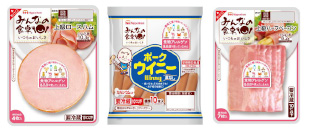
Basic Views
In 1996, the Group received an earnest request from a customer to develop food products that even children who have food allergies can eat. The Group has been aware of the existence of customers with concerns regarding food, and for more than 20 years we have been taking measures to address food allergies. Nevertheless, understanding of food allergies is still inadequate in general. We are working to create a society where individuals with food allergies as well as those without can eat enjoyably and confidently.
Promotion Systems
Personnel responsible for conducting research and development regarding food allergies, food manufacturing and sales, and disseminating information gather to share information and collaborate on initiatives.
Major Initiatives

Timeline of Initiatives
The Group began research and development of allergen-free products in 1996.

Research & Development
In addition to developing allergen-free products, we also conduct research and development of food allergen detection technologies.

Allergen-free Products
Allergen-free products are manufactured at a special-purpose factory that bans eight specified allergen ingredients from the premises.

Food Allergy Support
From the perspective of a food manufacturer, we disseminate information to enrich the lives of persons with food allergies.

The Nipponham Foundation
The Nipponham Foundation supports research on food allergies and conducts educational programs.
Future Initiatives
Going forward, research and development, manufacture and sale of products, and dissemination of information will remain as pillars of our initiatives for the creation of a society where individuals with food allergies can experience the joy of eating with confidence.
Significant progress has been made in research on food allergies, and much new knowledge has been accumulating. For clinical diagnosis, antigen-specific IgE antibodies*1 are often measured, but an accurate diagnosis can be made only by taking a detailed history and performing oral food challenge test*2. In cases where an individual has eczema or atopic dermatitis, it is necessary to improve the skin condition before the oral food challenge test is performed, so skincare guidance*3 should be provided. Unfortunately, a significant number of facilities are unaware of such a proper diagnosis process or are unable to perform it.
Another issue is the belief that an individual with a food allergy must avoid the offending food completely. It is now believed that eliminating to the minimum necessary amount of the offending foods based on an accurate diagnosis, and that consuming a small amount of those foods within a safe range, can help prevent a critical reaction if such foods are consumed, or make those food allergies tolerable in the future. In addition, food allergy labeling is convenient for those who have food allergies, but can lead to the misunderstanding among consumers that selecting foods that do not contain specified allergen ingredients for infants can prevent the onset of allergies. The latest research suggests that actively eating such foods during infancy (before the onset of symptoms) may be beneficial.
Based on my long experience, I believe that the most important things are an accurate diagnosis and the dissemination of accurate knowledge. We need to disseminate information regarding accurate diagnoses to healthcare institutions and professionals and convey accurate knowledge to individuals who have allergies, their families, schools, and broadly throughout society.
I appreciate the Group’s development of allergen testing kits, manufacture and sale of allergen-free foods, and various other measures taken over many years. I encourage the Group to make even greater efforts in the future regarding food allergies including the dissemination of information and educational measures.
- Note1: A test method for measuring antigen-specific IgE antibodies (antibodies that cause an immediate allergic reaction).
- Note2: A test whereby a patient consumes foods with suspect allergens to determine if symptoms occur.
- Note3: The fundamentals of skincare are cleansing and moisturizing. For details, refer to the 2016 Guidelines for Management of Atopic Dermatitis or other information sources.

Head, Department of Allergy and Clinical Immunology
National Research Institute for Child Health and Development
